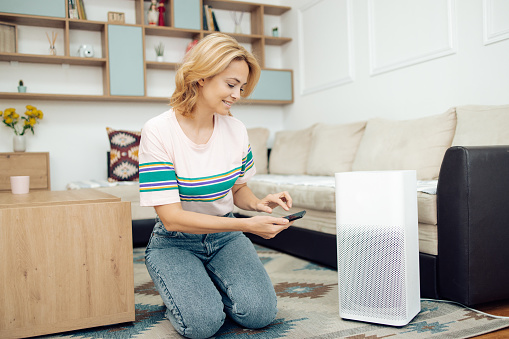9 Reasons Your Home Needs an Air Purifier
The volume of pollutants in the environment, both outdoors and even indoors, is becoming more of a worry. An air purifier makes a tantalizing commitment: to purify the airflow in your house by removing all pollutants such as smells, soot, pollen, and other airborne dirt. Considering that certain contaminants might be five times greater in ambient air compared to the outside air. Air purifiers can help in mitigating the dangers caused by pollution and different indoor activities. Air purifiers also help in freshening up stale air, decreasing the risk of developing health problems induced by indoor pollution, which can cause breathing problems, neurodegenerative disorders, and exacerbate symptoms of asthma.
Air purifiers of high quality remove a variety of indoor air contaminants, keeping us safe. When air from within the house is drawn into the air purifier, it goes through a filter that is installed inside it. The filters collect dust as well as other airborne contaminants, then pump fresh air back to the house. Many purifiers are intended to eliminate specific pollutants, while others are specially crafted to remove fumes. Here are some major benefits of purchasing an air purifier.
Benefits of Using an Air Purifier
- Keeps children safe: Your child's developing physique is not the same as yours. As their body's metabolism is undeveloped, they can't always eliminate toxins as successfully as adults can. Thus, they are much more sensitive to the impacts of pollution in the air. Dust mite allergies are common among children where dust particles and toxins in the air can worsen and even induce these conditions.
- Takes care of Asthma: Pollens are carried in by the breeze via open windows or cling to your clothing when you go outside. The most prevalent indoor allergy is dust mites, which thrive in a humid atmosphere and are major Asthma triggers. These pollens, mold spores and pet dander that drift around the house are caught in the air purifier's multiple filters, allowing you to breathe clean air.
- Keeps multiple chemical sensitivities (MCSs) at bay: Many air purifiers specialize in systems for a wide range of chemical exposures and often provide relief where everyone else has faltered. These are some inert air purifier units in the market that are often customized as per elements like conventional cotton pre-filters, burnt-in motors and charcoal cartridges.
- Eliminates chemicals: Even though you do not reside in a major city with a lot of traffic, the chemicals from cleaning products might contaminate the air in your house. Shutting our apartment's doors or windows does not imply we can keep outside contaminants like Sulphur dioxide, carbon monoxide and other chemicals out.
- Enhances air quality: Indoor air quality is bad even in the cleanest dwellings. Since most of the products and equipment used in our homes nowadays emit minor quantities of chemicals, this is the case. These aren't easily eliminated with a duster or a deodorizer. This is where air purifiers step in.
- Removes odor: You won't have to dwell on the smell or even the stench of cooking and seasonings affecting your guests and ruining the ambience if you have them home. Air purifiers neutralize all odors, leaving your space smelling pleasant and clean as ever.
- Eradicates illnesses: Airborne illnesses like the cold or the flu are transmitted by microscopic germs floating through the air. Whenever one member of the family has a fever, the entire family is likely to become ill as well. This occurs because everyone inhales the very same air, which is contaminated with germs and viruses. These germs and pathogens are captured by air filters, thus maintaining a healthy and hygienic environment.
- Takes care of your pets: Our pets, like kids, are inherently more vulnerable to the impacts of indoor air pollutants. They spend far more time indoors and are closer to the ground, where dust, pollutants, and other airborne contaminants collect. An air purifier will serve to protect your pets from household air pollution by removing floating pet hair, allergens, and stink.
- Lowers chances of mold: Moisture stains aren't the only thing that comes as a result of water leaks in the home. Mold is likely to be present in your home. Mold emits both nanoparticles and molecular biotoxins into the air, which many people have no idea about. Mold’s health consequences can vary from allergic responses to serious disease, depending on the volume of contact.
Things to Consider Before Purchasing an Air Purifier
There are a few things you should consider before purchasing an air purifier. Purifiers use a variety of technologies to accomplish their goals. Large particles like pet hair are removed using pre-filters such as Styrofoam and non-woven polyester before another step of filtration. Pollen, animal skin and fur, mold spores, and dust are all cleaned by true HEPA filters. Filters for HEPA air purifiers must be replaced on a regular basis. More the particles that a HEPA filter can remove, the bigger it is. The effectiveness of an air purifier is heavily influenced by the size, quality, and structure of its filtration system. Filters containing activated charcoal would be used in conjunction with other filters. Filters made of activated charcoal capture smells and gases, neutralizing smoke, toxins, food aromas, and gases. Carbon filters must also be changed after extended use. In addition to that, some filters that are antimicrobial and germicidal aid in the elimination of dangerous disease-causing bacteria. The dimensions of your space are an essential consideration when selecting an air purifier. Larger areas necessitate greater air purifiers, so help ensure you choose one that can function in an area bigger than that of the room for the greatest results. The sort of air purifier to use is also determined by the room. For instance, when shopping for a bedroom air purifier, look for one that is quiet so you can sleep well. Keeping these factors in mind, we’re sure you’ll only choose the best!






